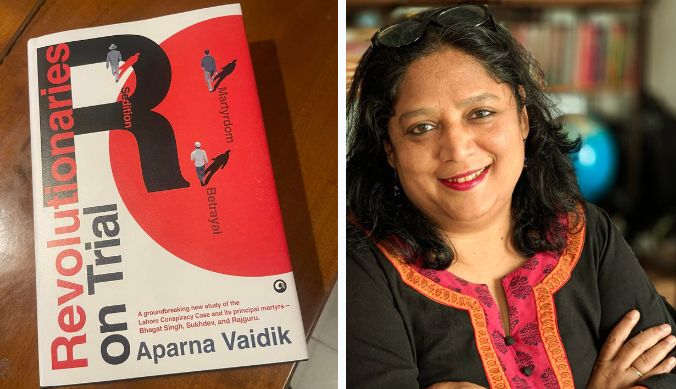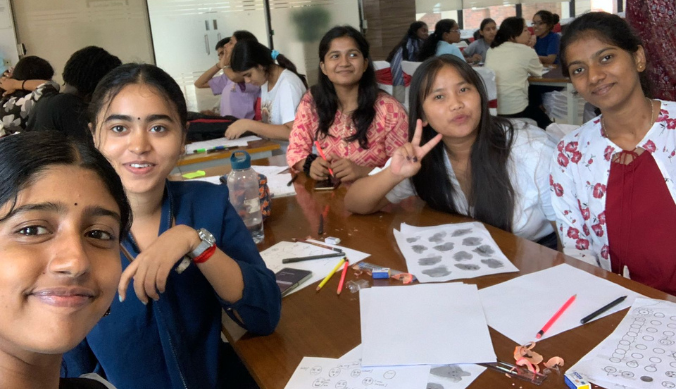#Bookmarked: Unraveling the Lahore Conspiracy Case- Revolutionaries on Trial by Aparna Vaidik
Ashoka Professor Aparna Vaidik’s latest book provides the readers with a profound understanding of the complexities surrounding the Lahore Conspiracy Case.
Revolutionaries on Trial is a groundbreaking new study that delves into the infamous Lahore Conspiracy Case, shedding new light on one of the pivotal events in India’s struggle for independence. The history of the Lahore Trial has often been portrayed as a miscarriage of justice and a failure of the colonial state to uphold the rule of law. However, this book expands the narrative, exploring the complex interplay of various actors involved in the trial.
The Lahore Conspiracy Case centers on the principal martyrs Bhagat Singh, Sukhdev, and Rajguru, who belonged to the Hindustan Socialist Republican Army (HSRA). These young revolutionaries were tried in Lahore Central Jail in a trial named after the city of Lahore, where it was booked and held from 23 July 1929. On 7 October 1930, the judge pronounced them guilty of conspiring and waging a war against the British crown. Bhagat Singh, Sukhdev, and Rajguru, whom the Indian public largely viewed as innocent, were sentenced to death, while others received varying jail sentences.
This book scrutinises the intricate performances of four sets of actors in the trial: the colonial state as the plaintiff, the revolutionaries as the defendants, the prosecution witnesses, and the Indian press and public as spectators. Each group had distinct motivations, aspirations, and perspectives on the desired outcome of the trial. The book captures the extensive reach of the trial, which extended beyond the courtroom to various locations such as investigation offices, legislative assemblies, government offices, jails, streets, printing presses, newspapers, coffee houses, meeting rooms, and universities across North India.

The book raises thought-provoking questions about the trial such as: Why did the colonial state bother to put the revolutionaries on trial despite the vast repertoire of violence at its disposal? What more was there to the revolutionaries’ trial strategy other than using the process for propaganda? Is it possible to write a history of nationalism that incorporates acts of collaboration like spying, informing, perfidy, and denunciation without the implicit moral judgment and destructive potential embodied in the term? In what way did the trial shift the public perception about the revolutionaries, if at all?
The book draws on rare archival material, including the trial records from Lahore, Pakistan, the National Archives of India, oral history interviews of surviving revolutionaries, their memoirs, letters, diaries, Indian and British newspaper records, Legislative Assembly debates, and police investigation records. Its research spans over a decade and includes multiple field trips to Lahore, meticulously combing through archives and libraries spread across different countries.
About the Book: Lucidly written and grounded in impeccable scholarship, “Revolutionaries on Trial” vividly brings to life the people and events of a trial that significantly impacted the history of nationalism and revolution in India. Aparna Vaidik’s work offers readers a profound understanding of the complexities surrounding the Lahore Conspiracy Case.
About the Author: Aparna Vaidik, a distinguished historian and Professor of History at Ashoka University, has a rich academic background that spans teaching at Georgetown University, Washington DC, and the University of Delhi. Educated at St. Stephen’s College, Cambridge University and Jawaharlal Nehru University, she is a recipient of research grants from the British Academy, Andrew Mellon Foundation, Indian Council for Historical Research, and Charles Wallace India Trust. Her scholarly contributions include notable works like Waiting for Swaraj: Inner Lives of Indian Revolutionaries (Cambridge University Press, 2021), My Son’s Inheritance: A Secret History of Lynching and Blood Justice in India (Aleph 2020), and Imperial Andamans: Colonial Encounter and Island History (Palgrave Macmillan, 2010).
Study at Ashoka













